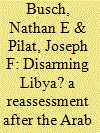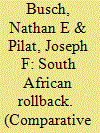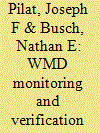|
|
|
Sort Order |
|
|
|
Items / Page
|
|
|
|
|
|
|
| Srl | Item |
| 1 |
ID:
119455


|
|
|
|
|
| Publication |
2013.
|
| Summary/Abstract |
In 2011, several months after a popular revolt overturned the Gaddafi regime in Libya, Libya's new National Transitional Council announced the discovery of what was later confirmed to be an undeclared stockpile of chemical weapons. This was a startling announcement to many observers, since Libya had publicly renounced its weapons of mass destruction (WMD) programmes in 2003 and had apparently dismantled the programmes soon after.
Although the Libyan case had repeatedly been referred to as a positive 'model' for nonproliferation - an instance where a country had voluntarily and peacefully rolled back its WMD programs - this recent discovery forces us to wonder whether the Libyan 'model' really was as successful as initially described.
This article examines the successes, challenges and lessons that can be learned from the Libyan case of WMD renunciation and verification. As one model of cooperative verification, the Libyan case highlights not only the opportunities afforded by monitoring and verification regimes, but also some of the difficulties that any such regime will encounter in real-world circumstances, however positive.
|
|
|
|
|
|
|
|
|
|
|
|
|
|
|
|
| 2 |
ID:
058898


|
|
|
|
|
| Publication |
New Delhi, Manas Publications, 2005.
|
| Description |
xiv, 490p.
|
| Standard Number |
8170492254
|
|
|
|
|
|
|
|
|
|
|
|
Copies: C:1/I:0,R:0,Q:0
Circulation
| Accession# | Call# | Current Location | Status | Policy | Location |
| 049149 | 327.1747/BUS 049149 | Main | On Shelf | General | |
|
|
|
|
| 3 |
ID:
133993


|
|
|
|
|
| Publication |
2014.
|
| Summary/Abstract |
As the only country in history to have created, then voluntarily renounced, a nuclear arsenal, South Africa is often referenced as a potential model for nuclear disarmament. However, this article argues that there are sharp limitations on the extent to which the South African case can be applied as a model for other countries to follow. Because South Africa unilaterally dismantled its program and only brought in inspectors from the International Atomic Energy Agency (IAEA) and key member states after the dismantlement was complete, information vital to the verification process was lost to the international community. As a model of a cooperative verification, South Africa thus highlights both the difficulties that monitoring and verification regimes will encounter, as well as the opportunities that they afford.
|
|
|
|
|
|
|
|
|
|
|
|
|
|
|
|
| 4 |
ID:
106773


|
|
|
|
|
| Publication |
2011.
|
| Summary/Abstract |
In the years following the 2003 invasion of Iraq, there emerged a generally accepted view that the US government misinterpreted, or even deliberately misconstrued, the intelligence on Iraqi weapons of mass destruction (WMD) and that, in sharp contrast, international monitoring and verification regimes correctly verified prior to the war that Iraq had no WMD and deterred Saddam Hussein from pursuing them. Critiques of international inspections tend to overstate their capabilities and the levels of confidence that inspection processes can give the international community in verifying weapons development and rollback claims. The Iraqi case is important for thinking about current and future monitoring and verification regimes, but important lessons are being overlooked - and the wrong lessons are being learned. A sober reassessment of the strengths and weaknesses of the monitoring and verification in Iraq provides important lessons for those dealing with difficult cases now and in the future.
|
|
|
|
|
|
|
|
|
|
|
|
|
|
|
|
|
|
|
|
|